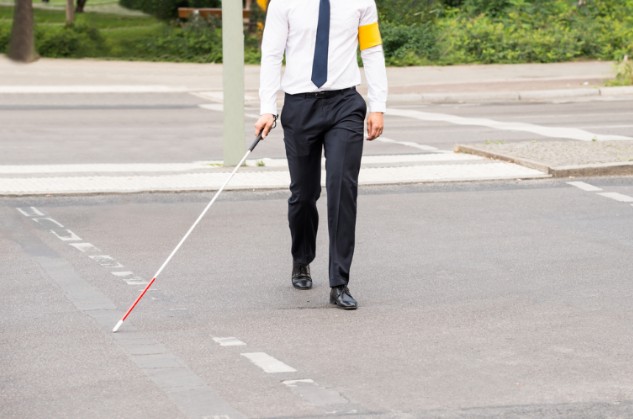Most People Don't Understand What It's Like to Be Blind
Discover the challenges the blind face daily in navigating the world. Rabbi Yosef Chaim Ben David's guide offers insights into how to properly assist the blind and outlines special religious laws applicable to them.
 Rabbi Yosef Chaim Ben David
Rabbi Yosef Chaim Ben DavidA blind person stands by a busy street crossing waiting for help. Passersby rush to their buses or jobs, chatting on the phone, or are just too preoccupied to notice the surroundings.
Suddenly, a kind-hearted individual stops, someone who loves doing good deeds, and politely approaches the blind person. Is his problem solved? Not quite. Rabbi Yosef Chaim Ben David describes what happens next in his guide "Seeing with Closed Eyes," a handbook of guidelines and laws for the blind that also addresses the general public:
"In a loud voice full of empathy, he will ask: 'May I help?'If the offer is accepted, he will hold my hand tightly as if I might need firm support to step down from the curb, perhaps thinking I could be paralyzed.And that's it... he leaves me at the first step of the crossing, hurrying back to his affairs, content and joyful for the mitzvah of the morning. He's convinced that all my problems are solved by stepping down from the curb. He doesn't understand that a blind person is cautious about the cars and bustling traffic on the road, and by leaving me facing a honking motorcycle speeding at the street's edge,he's endangering my life. This situation doesn't begin and end with crossing the street. Observers often mistakenly believe that a blind person is also deaf, or worse, a fool unable to comprehend or at least mentally limited.
Too harsh? Rabbi Ben David, blind from birth, born in New York, and now living in Israel at 29, states that through his years in the country, he concluded that most people don’t know how to approach a blind person. Thus, experiences such as being left in the middle of the street happen to him; a blind person visiting a government office with a seeing child is likely to find the staff addressing the child instead of them; and repeatedly, the blind find themselves interacting with people who lack the imagination to understand their difficulties: disappearing from their vicinity without notice, or presenting them with meals that are impossible to eat neatly without sight.
"People simply don't know anything about the blind," says Rabbi Ben David. "If you ask the average person without a blind family member what they know about the blind, they recall some touching story they once heard and know that the blind get bus fare discounts, and that's it. People have no idea about the many challenges the blind face."
 (photo: shutterstock)
(photo: shutterstock)And these challenges are more than one might think. A blind person can’t simply walk outside without a cane—though the cane doesn’t help them cross streets, where they need the help of passersby (the noisy button installation on traffic lights aims to solve this issue but is relevant only to light-controlled streets). The blind depend on their sense of touch for orientation and panic if left in an open space without holding something—something people aren’t aware of. At a celebration, they’re served food—yet can’t use their sense of touch and remain clean; they need to be told exactly what's on the plate and where. (To do this, the plate is imagined as a clock: chicken at three, rice at six, and so on). When shopping and paying with bills, they have no way to know which bill they're holding. While bills supposedly have markers for the blind, these wear out quickly and become unreliable.
In his booklet, Rabbi Ben David details these challenges and explains the best way to help the blind manage them. Beyond general challenges applicable to any blind person, he points out specific challenges for religious blind individuals.
"There's much to improve even within Torah observant circles. I hear often of cases where blind people arrive at a synagogue and no one approaches them or says hello. Or there are things blind people need that receive strange looks because people fail to understand their necessity. The blind have a special phone that reads all numbers and contacts—but it lacks a 'kosher' certification. But what can be done? For a blind person, it’s a health need, and dangerous to be without it. People must understand that a blind person's life experience is entirely different. Just as they need a talking clock, so do they need a talking phone."
Rabbi Ben David emphasizes in his book that there is a fine line when it comes to treating blind individuals: "From my personal experience and those I’ve known: the blind who cope best are those who have received much support and love, but also consistently were expected to do what they can accomplish. One must not demand from them what is demanded from others, as some things are truly impossible for them. But what they have learned to do—they should do. In our home, for example, I don't let my wife peel vegetables. I know well how to peel vegetables and insist it's my job."
 (photo: shutterstock)
(photo: shutterstock)The second part of the booklet contains a collection of relevant halachot for the blind: Does a blind person recite the blessings for sight? (over lightning or a rainbow, for example), Is he required to utter the 'Yotzer Or' blessing in prayer? Are sacred books in Braille subject to genizah? Is a blind woman obligated in lighting Shabbat candles?
"I searched for halachot where blind individuals are mentioned in a comprehensive record I have, and gathered them," says Rabbi Ben David. "The booklet was first published five years ago, and friends in the yeshiva asked me when I'd produce material on other topics, like halachot of Shabbat, but I explained that I don’t plan to. I chose the topic of the blind because nobody else has written about it."
Indeed, the booklet "Seeing with Closed Eyes," also distributed for free online, is groundbreaking in both its second, halachic part, and its first, informative part. "Many people have reached out to me since the booklet's release to express their shock at how little they knew about the blind. Blind individuals also told me they greatly enjoyed it. How did a 50-year-old blind man put it to me? In Israel, there are successful and well-known blind individuals in many professions; it's amazing that until now no one thought to write such a necessary treatise."
To download the "Seeing with Closed Eyes" booklet, click here.

